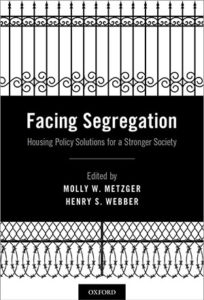 Fifty years after the passage of the Fair Housing and Civil Rights Acts, a new book, “Facing Segregation: Housing Policy Solutions for a Stronger Society,” brings together influential scholars, practitioners and policy analysts to reflect on how to use public policy to reduce segregation.
Fifty years after the passage of the Fair Housing and Civil Rights Acts, a new book, “Facing Segregation: Housing Policy Solutions for a Stronger Society,” brings together influential scholars, practitioners and policy analysts to reflect on how to use public policy to reduce segregation.
The 280-page volume, released Dec. 3 from Oxford University Press, focuses on achievable solutions. Editors Molly W. Metzger, assistant professor at the Brown School at Washington University in St. Louis, and Henry S. Webber, executive vice chancellor and chief administrative officer at the university, have gathered the field’s first collection of prescriptions for what ought to be done.
The authors present arguments for new policy actions, ranging from local innovations to national initiatives.
“Segregation harms us all, not just those residing in disadvantaged communities,” wrote Metzger and Webber in the opening chapter.

“It stifles economic growth in our metropolitan areas, threatens the functioning of our democracy, and calls into question fundamental ideals — such as the principle of equality of opportunity — that contribute to many Americans’ definition of what makes our country great.”
Metzger is director for inclusive housing at the Brown School’s Center for Social Development. Her research focuses on public policy, structural racism and residential segregation in the United States. A community-engaged scholar, she works with housing advocates in the St. Louis region to bring an evidence-based approach to activism.
She also is lead author of the paper “Fair Housing and Inclusive Communities: How Can Social Work Move Us Forward?” for the national Grand Challenge for Social Work initiative, which aims to achieve equal opportunity and justice for all.

In addition to his administrative duties, Webber is also professor of practice at the Brown School and at the Sam Fox School of Design & Visual Arts. His research and writing center on community development, mixed-income housing, racial and economic segregation, and the role of anchor institutions in urban development.
In addition to Metzger and Webber, 12 scholars contributed to the volume. They suggest a variety of strategies, including:
- enforcing housing anti-discrimination laws;
- locating projects from the Low-Income Housing Tax Credit program in low-poverty areas, or near high-quality schools;
- making housing vouchers more useful by assisting families to locate in high-opportunity areas, modifying policies to discourage voucher use only in lower-poverty communities, and minimizing jurisdictional barriers to using vouchers;
- interpreting the Community Reinvestment Act to support mixed-income housing in both cities and suburbs;
- promoting scattered-site rehabilitation and preservation of affordable housing in high-income neighborhoods through nonprofit-owned affordable housing or community land trusts;
- adding inclusionary zoning requirements to development incentives; and
- eliminating local zoning rules that make affordable housing impossible—for example, rules specifying minimum lot sizes.